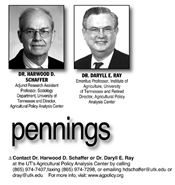|
USDA Provides Basic Goods And Services For Rural Residents

A book that we have recently read, “No Small Hope: Towards the universal provision of basic goods” by Kenneth Reinert, makes the argument that there is a minimal set of basic goods and services that should be put into the hands of everyone in the world. Reinert is Professor of Public Policy and the Schar School of Policy and Government at George Mason University. Reinert brings a wealth of experience to his analysis, having served as Senior Economist at the US International Trade Commission and consultant for the World Trade Organization, the OECD Development Organization, the World Bank, and the US Department of Commerce.
In his book, Reinert argues that the minimal set of basic goods and services that should be available to every person in the world includes “nutritious food, clean water, sanitation, health services, education services, housing, electricity, and human security services.” Looking at that list, one cannot help but notice that some aspect of most of these basic goods and services are part of the work of the United States Department of Agriculture (USDA).
The connection between the USDA and the growing of food is obvious. And, as anyone who has followed recent farm bill debates knows the largest single item in the farm bill is the Supplemental Nutrition Assistance Program. Rural communities depend on grants and loans from the USDA to build water distribution and waste water treatment facilities.
The responsibilities of the Farmers Home Administration, including the insuring of home loans for properties in rural areas, are now a part of the Farm Service Agency. The work of the Rural Electrification Administration, brought electricity to rural farms and communities in the middle of the 20th century and is presently a unit of USDA’s Rural Utility Service. The Cooperative State Research, Education and Extension Service provides educational programs and services to farmers and farm families that go beyond those provided by local public schools.
In many ways the programs of the USDA serve as a validation of the list of basic goods and services set forth by Reinert.
In his discussion of the merits of providing unrestricted cash transfers directly to people for the purchase of food compared to providing conditional cash transfers that set restrictions on the items that can be purchased we found Reinert speaking directly to most of us.
He writes, “[A] way of enjoying oneself is to purchase things other than food even when your diet is far less than ideal. These could include televisions, festivals, videogame parlors, and much more. It is not that the poor are stupid in this regard. It is just that the poor are very much like the nonpoor in their behaviors. Indeed, the pursuit of something tasty is a part of what drives the obesity rates in both rich and poor countries.” How many of us have to say, “guilty as charged”?
He then discusses policy interventions that have been shown to be useful including “pregnant mothers and their infants…. Evidence suggests that programs that improve the nutrition for these individuals have positive repercussions for for both health and education throughout the children’s lives.”
While there are many who believe that American farmers will play a significant role in reducing the number of people around the world who suffer from significant undernutrition, the picture is more nuanced than that. It is clear that exports are important to the financial health of the US farm sector, but the solution to world hunger goes beyond the corn, wheat, and soybeans produced on US farms.
In the last four years we have seen the price of crops fall by as much as half to a point where the current prices are below the full cost of production for many farmers. And yet, even at that price level – the result of increases in carryover levels for most crops – the hungry of the world cannot afford to take the surplus off our hands.
Even as we wrestle with the provisions of our own farm bill and its impact on farm profitability, we cannot afford to ignore the challenges facing farmers around the globe – most of the world’s hungry live in rural areas. ∆
DR. HARWOOD D. SCHAFFER: Adjunct Research Assistant Professor, Sociology Department, University of Tennessee and Director, Agricultural Policy Analysis Center
DR. DARYLL E. RAY: Emeritus Professor, Institute of Agriculture, University of Tennessee and Retired Director, Agricultural Policy Analysis Center
|
|